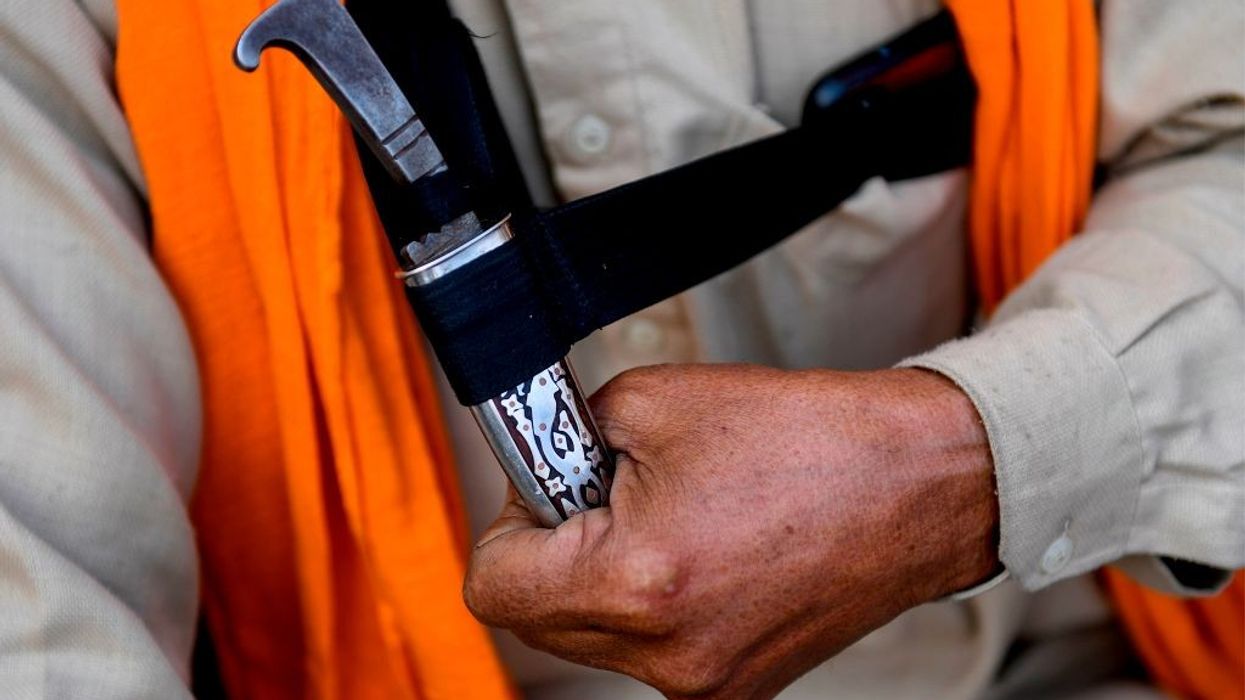Unlawful ban from entering courthouses of tribunals in England and Wales may greet practising Sikhs under prevailing security guidelines over kirpans, a case which was heard on Thursday (9) by the lord chief justice and the vice president of the court of appeal said.
According to a report by The Guardian, in a hearing which many experts feel is of national importance, legal representatives for Jaskeerat Singh Gulshan challenged the security policy of the courts and tribunals related to kirpans, the ceremonial short knife with a curved blade that practising Sikhs must carry at all times.
In 2021, Gulshan, a British-Sikh lawyer and one of the founders of the Sikh Lawyers Association, was barred from entering a magistrates' building in Ealing in west London till he removed his kirpan.
Under the court security policy being followed currently, Sikhs are permitted to carry a kirpan into a court or tribunal building if the overall length is not over six inches and the blade is not longer than five inches.
But Gulshan differs with the rule, saying that it would not be possible to comply with what his faith requires with a five-inch blade as in that case, the handle would measure only an inch and hence impossible to hold, the report added.
In April 2021, Gulshan was stopped from entering the Ealing magistrates' court as his kirpan measured eight inches in overall length. The length of the blade was within the permissible length of four inches.
The obstacle he faced to enter the court with his kirpan, he argued, violated both primary legislation and separate right for people to manifest their religious faith under the Human Rights Act.
The primary legislation allows people to carry kirpans of any length for religious reasons in the open.
“In light of the HMCTS [HM Courts and Tribunals Service] guidance as it currently stands, it is apparent that a Sikh lawyer … cannot expect to practice law because he has effectively been banned from appearing in court in violation of his right to carry a kirpan as protected by UK legislation,” Parminder Saini, Gulshan’s barrister, told the lord chief justice, Lord Burnett, and the vice-president of the court of appeal, Lord Justice Underhill, The Guardian report added.
“Sikhs are unique in being a protected religion as well as a race. As a person of Sikh ethnicity, this systemic discriminatory treatment therefore occurs on both religious and ethnic grounds, and equates to systematic discrimination against Sikhs,” he added.
The government said in its skeleton argument on behalf of the lord chancellor that the security policy came into force after consulting the Sikh community. Saini countered it saying the government spoke with the smaller Supreme Sikh Council and not the Sikh Council UK, the community's largest platform in the country, the report added.
The Sikh Council UK was also not pleased with the security policy.
Sukhjeevan Singh from the council said in his submission to the court, “We are extremely disappointed that HMCTS has published a policy without seeking guidance or recommendation from us and without any proper consultation with the community.”
He said the Sikh Council UK “condemns” the courts' policy on kirpans.
“To design and manufacture such a kirpan would be a mockery of our sacred article of faith,” he said.
According to Saini, the court's guidance is unlawful since it seeks to overrule primary legislation -- it is not a crime to carry an article with a blade in public if a person has it with him for reasons that are religious.
He added that the court's guidance “unequivocally contravenes” the Human Rights Act 1998 and the European convention on human rights protecting Gulshan’s right to manifest his religious take.
“By prohibiting the length of a kirpan that can be carried the guidance also impermissibly seeks to treat the kirpan as a bladed article, contrary to its designation under primary legislation and its categorisation as an article of the Sikh religion and race. The importance of this distinction should not be taken lightly,” he said.
In its submission, the government said the permission to appeal should be refused as the policy falls under the legitimate aim of protecting others' security.
Saini’s objections, according to it, are “a misreading of primary legislation”.




